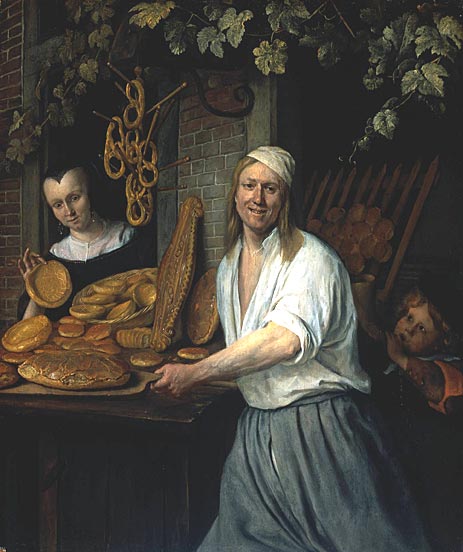The Happy Baker
May 23, 2010

PEOPLE who make bread are the happiest people in the world.
Look at this painting by the Dutch master Jan Steen, The Leiden Baker Arend Oostwaert and His Wife. Notice how glowing Arend is and how sallow his wife. That’s obviously because he is the handler of the dough. Kneading dough is an unparalleled sensual experience and Arend’s countenance speaks of this ancient reality. I mean, it’s almost unparalleled. Anyone who makes bread from scratch at least once a week is guaranteed sanity and a better disposition than if he didn’t make bread once a week. People who never make bread suffer from repression. It doesn’t matter what it tastes like. Making it is good enough.
— Comments —
Jim Wetzel writes:
That must be my problem: I bake bread, but I surely don’t do so as often as once a week. I need to pick up the pace substantially.
Also, I note that you describe Steen as a “master.” That’s evident. Look at the baker’s left arm: the rough skin on the elbow, the veins evident on his lower forearm. I’ve seen that in the mirror before. It would be easy to mistake that painting for a photograph. There’s an artist with an exact eye and a ton of ability to go with it. Thanks!
Laura writes:
I’m impressed that you recognize your problem and are ready to do something about it. You are cured. That beautifully rendered arm in the painting is the instrument of a master baker. As you’ve already discovered (unless you happen to be one of those decadent types who relies on a fancy mixer or a bread machine), kneading dough does develop a limited but important subset of muscles, as well as the mental and spiritual faculties.
Van Wijk writes:
According to the HBDers, we should all be eating like cavemen in order to become tall, intelligent ubermenschen. Your baker needs to get with the times.
On the other hand, I wonder how many HBDers are as happy as he is. If they are, they have a funny way of showing it.
Laura writes:
Science offers more and more evidence that bread is lethal. The solution may be to make bread and then throw it away or use it as a decorative object. If they proved that people who laugh less live longer, would you choose to laugh less often?
Jim B. writes:
I must confess, although I make bread, I am one of those decadent mixer users. I’m sorry, but you can take my Kitchenaid when you pry it from my cold, dead (but uncalloused) hands!
And as for the health of bread, the key is to eschew nasty commercial yeasts and cultivate a sourdough starter. The symbiotic bacteria in the starter do a good job of predigesting the nasty stuff in bread, as well as giving it a tangy taste. It just takes more time – you need to actually plan ahead and aloow the dough to rise 12-18 hours. As usual, our modern world has sped things up and removed both flavor and health for the equation.
Kidist Paulos Asrat writes:
Baking requires precision and lots of practice. You cannot wing baking – like stir-frying, for example.
This modern culture hates baking. I notice this in the numerous cooking shows that are out there. Almost all of the “cooks,” especially the female ones like that awful Rachel Ray, profess that they cannot bake. Instead, the gear all their recipes to “30-minute” fast cooking. For all those working Moms, you know, who have to do it all, including performing subsidiary tasks like feeding their families.
The art of baking, which is becoming a lost tradition, will be very hard to recuperate. There are an endless number of “tricks” and secrets that women pass on to the next generation which will now stop right here. Anyone who endeavors to bake now has to rely on cookbooks and untiring patience to get it right. Or watch endless Julia Child and Martha Stewart (yes she does keep up the tradition) shows. But, who will be left to ask those immediate questions when the crust is too hard, or the bread doesn’t rise?
Plus, people will lose out on what you commented on: the pleasure of a homemade baked bread or pie. It is so much better than saying “I bought it at the supermarket.”
Rev. James Jackson writes:
Fascinating discussion as usual about bread and cooking.
If I remember correctly, I think it was Menninger’s clinic – one of the most famous mental health hospitals in the country – that did a number of studies on different things which might be conducive to mental health, especially as they come through the external senses. I can’t claim to understand all these things, but they make sense to me. For touch, it was petting a cat, with that purring sound they make. For sound, it was Gregorian Chant. For smell, it was baking bread. Given the madness of the present culture, I understand why Gregorian Chant is so useful in a mental health facility, since the only thing which would calm the madness of Saul was David singing Psalms on his lyre. The melodic fragments of those ancient songs are in Chant. For the bread, well, that just makes sense.
